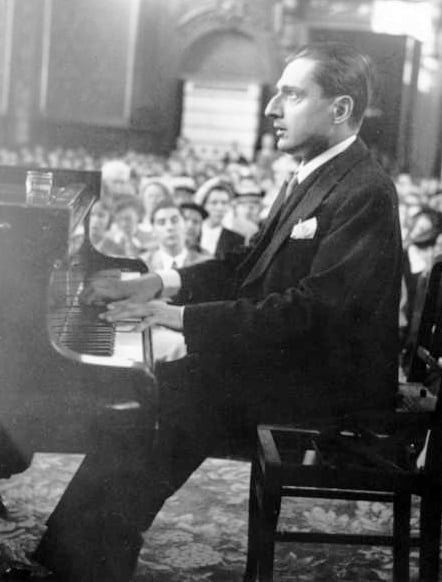
Bibliothèque nationale de France
Constantin “Dinu” Lipatti (1917-1950) was born into a musical family in Bucharest, his father an amateur violinist and his mother a pianist, and Dinu’s first teacher beginning at the age of 4. Dinu’s godfather was the composer and musician George Enescu, who had a very positive influence on him. At age 11, Dinu entered the Bucharest Conservatory where he studied with Florica Musicescu, and in 1932, graduated at age 15 with a performance of Chopin’s Piano Concerto No. 1 in E minor Op. 11. The following year, he performed Liszt’s Piano Concerto No. 1 in E flat in public for the first time.
In 1933, after placing 2nd at the Vienna International Competition for Singing and Piano, jury member Alfred Cortot resigned in protest over the result, and subsequently invited Dinu to study with him at his École Normale de Musique in Paris. Composition studies there were with Paul Dukas and Nadia Boulanger.
Health
Throughout his life, Dinu suffered from various health ailments, and had only one working lung. When he was a child, he was frail to the point that his parents decided against sending him to school and instead opted to employ tutors. In 1943, after a mysterious and persistent fever appeared, Dinu began a routine of experimental treatments and drugs that would last years and cause a variety of side effects. Finally in 1947, Dinu’s failing health was diagnosed as a form of leukemia known as Hodgkin’s Disease.
During his final years between 1947-1950, Dinu’s declining health caused frequent cancellations, and scheduled concert tours were either postponed or scaled back. Additionally, more demanding works in his repertoire were replaced with more manageable ones, and hopeful future recording projects of Beethoven’s Emperor Concerto and Tchaikovsky’s Piano Concerto No. 1 remained on hold.
The Besançon Festival Recital
Dinu gave his final recital at the Besançon Festival in France on September 16, 1950. In a true mind over matter performance, Dinu gives the public one final display of his remarkable musical insight and perseverance in a program consisting of Bach, Mozart, Schubert and Chopin. Too weak to perform the final Chopin Waltz of the set of 14 which was planned, Dinu instead performed Bach’s Jesu, Joy of Man’s Desiring, a work which remained a staple for him over his entire 15 year career.
Less than 3 months after his recital at the Besançon Festival, Dinu passed away at the age of 33 from a burst abscess on his one working lung, and not from the leukemia which had taken a toll on his life for so many years.
The Besançon Festival Recital has been released under a few different labels, and while none of them (that I can find) include the final Jesu, Joy of Man’s Desiring, this version under the Erato label includes the audience applause, brief warm up by Dinu, and announcer commentary (albeit in French). I found this small inclusion, which I only recently discovered, a welcomed addition to an already unforgettable performance.
Legacy
Dinu Lipatti was perhaps the most flawless classical pianist of the recording era, an “artist of Divine spirituality” (Poulenc) whose playing was “perfection” (Cortot). With a masterful technique, deep musical insight, purity of tone, strong rhythmic sense and clarity, Dinu’s playing lacked nothing, nor was he limited by specific repertoire, performing Bach and Ravel with equal success.
Because of his tragically short career, and therefore fairly small recording output (thus far), Dinu Lipatti’s name never reached the popularity of a Horowitz or Rubinstein, nor did his brief legacy have enough of a foundation to withstand the passing of time. Had he lived a full life and reached his full artistic potential, Dinu Lipatti would perhaps be a name mentioned first in classical piano circles, rather than reserved only for the most serious fans of the instrument.
While Dinu Lipatti’s story is a sad one filled with heart wrenching drama, there is a beautiful aspect to it. The recordings Dinu left behind are absolute treasures of piano playing, masterclasses in the repertoire he put on record. And perhaps the relatively small discography helps us to focus and analyze his craft with a little more attention and appreciation.
